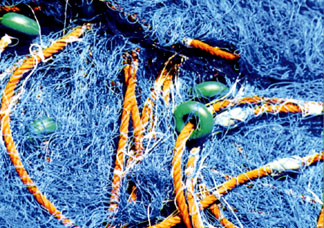|
observer |
|
|
|
|
|
OTHER LINKS |

|

|

|
Ad hoc distribution and oversupply of fishingnetsA complete shut-down of Sri Lanka's fishingnet industry stares in the face, stemming from ad hoc distribution and oversupply of fishnets to fishermen following the tsunami destruction of December 2004. The offenders are NGOs and aid organisations.
These benefactors stepped in as good Samaritans, following the wreckage of fishing craft and gear of December 2004 and have now heightened the chaos they have caused in the local fishnet supply and demand factor. Cey-Nor Foundation Ltd is the largest local producer of fishnets, and chairman Rohan Jayasinghe suggests that the NGOs and aid organisations intent on supplying fishnets to local fishermen, place their orders with local manufacturers, rather than buy sub-standard fishnets from overseas manufacturers. Jayasinghe backs his case on the grounds that the local industry produced 60 to 65 percent of the island's annual requirements of 1.2 million kilograms of nets, post-tsunami. Then, the balance 35-40 per cent requirement, mainly low ply nets, which are lower in production, here, was imported from China, India, Indonesia, Korea, Taiwan and Thailand. Following the tsunami, when there was a severe shortage of fishnets in Sri Lanka, the aid organisations and NGOs imported largely low ply fishnets for distribution to fishermen, here. But now, it is reliably learned that 3,550 high ply nets have been imported by FAO for distribution to local fishermen, compounding the local supply factor. Jayasinghe said that quantity of high ply nets equals nine months of Cey-Nor supply. Malba Ropes (Pvt) Ltd, Ja-ela is the only fish rope manufacturer in Sri Lanka with 60 tonnes output of rope per month, and 30 tonnes of 2 to 3 ply fishnets per mensum. Malba's chairman, S. Sarabanababan said that for the purpose of supplying to tsunami hit fishermen, the following aid and NGO organisations purchase fishnets from his company: FAO, UNHCR, Savalanka Foundation, Humudica (Germany), GOAL Italy, Action Faim Norway (among others). But, they all place orders for the same ply of nets. While these organisations supply fishnets ad hoc to fishermen or anyone who poses to be a fisherman, there are daily callers at his factory, requesting him to buy the same fishnets his factory sold for Rs 3,000 (Rs. 108 to a US dollar) for Rs 500. Irwin Weeresinghe, manager for Nets N Sea (Pvt) Ltd, said that in instances where before the tsunami, six people who went out in a outboard fishing boat, all six people claimed that they had a boat each and received fishnets and fishing gear from aid organisations and NGOs operating here. Weeresinghe alleges that some people who have never seen the sea have also been recipients of fishnets and fishing gear, donated by these benefactors. The aftermath of it is a gross oversupply of fishing nets lying idle or being offered by phoney recipients to anyone who will buy it for a song. But, aid organisations and NGOs keep up their purchases from overseas suppliers. Local fishnet manufacturers, with few orders, are now putting up their shutters. While all Sri Lanka fishnet manufacturers named above, have also exported fishnets, Cey-Nor obtained the Moody International, ISO 9001:2000 for manufacture of nylon fishnets. Jayasinghe said fishnets imported by benefactors mainly from China, are often not purpose-worthy. Some have wrong twists; colour runs; short in height and length; shows fluffiness and in some or other instances, are highly under durable. Cey-Nor's Lunuwila net factory with 209 workers, capable of producing 25,000 kilos of fishnet per month, was yet running, but under capacity. In the Cey-Nor Weerawila unit in the Hambantota electorate where 80 workers turned out 9,000 kilos per month of mainly small ply nets, only two machines work. "Weerawila was on the verge of expansion, with Norwegian aid, when this artificial oversupply situation surfaced," Cey-Nor's general manager, K D Liyanage said. Malba chairman, Sarabanababan said the government should step in. "Just increase the duty on imports of fishnets from the present 10 percent to 25 percent," he said. Indian fishnet imports, under the free trade agreement comes under an 8 percent duty, which must be raised to 25 percent. Sadasarana Fishing Net Factory Chilaw remains closed, the traders said, while their telephone rings continueously. J B Fishing is an established manufacturer of fishnets, but a spokeswoman declined to speak to us on telephone. |









